- Home
- P. D. James
Unnatural Causes Page 17
Unnatural Causes Read online
Page 17
Suddenly he made up his mind. He turned briskly towards Greek Street, hailed the first taxi that he saw and asked to be put down outside Paddington Underground Station.
He decided to walk from Paddington Underground to Digby Seton’s address. If Maurice Seton had come this way he might have taken a bus or even another taxi (had Reckless checked on that, Dalgliesh wondered) but the chances were that he had walked. Dalgliesh timed himself. It took exactly sixteen minutes of fast walking before he arrived at the archway of brickwork and crumbling stucco which led into Carrington Mews. Maurice Seton might have taken longer.
The cobbled entrance was uninviting, ill lit and smelt strongly of urine. Dalgliesh, unobserved, since the place was obviously deserted, passed under the archway into a wide yard lit only by a solitary and unshaded bulb over one of a double row of garages. The premises had apparently once been the headquarters of a driving school and a few tattered notices still clung to the garage doors. But they were dedicated now to a nobler purpose, the improvement of London’s chronic housing shortage. More accurately, they were being converted into dark, undersized and overpriced cottages soon, no doubt, to be advertised as “bijou town residences” to tenants or owners prepared to tolerate any expense or inconvenience for the status of a London address and the taste for contemporary chi-chi. The existing double garages were being halved to provide a downstairs room while retaining space for one small car, and the lofts enlarged to form a couple of cells for bedroom and bath.
Digby Seton’s cottage was the only one completed and the decor was depressingly orthodox. It had an orange door with a brass knocker in the shape of a mermaid, window boxes at the two minute square windows and a lamp in a wrought-iron holder above the lintel. The lamp wasn’t alight but this was hardly surprising since, as far as Dalgliesh could see, it wasn’t connected to the power. It struck him as being coy without being attractive and vulgar without being functional; in this it was symbolic of the whole house. The orange window boxes were sagging with their weight of caked earth. They had been planted with chrysanthemums and, when fresh, their gaiety had no doubt justified another two guineas on the rent. But the flowers, once golden, were now faded and brittle, and the dead leaves stank of decay.
He prowled around the cobbled yard shining his pocket torch into the dark eyes of the windows. The two adjoining garages with the rooms above were now being modernised. The interiors had been completely stripped and the double garage doors taken off so that he could step inside the shell and note with interest that there was to be a connecting door between the sitting room and the garage. Everywhere there was a smell of new timber, paint and brick dust. The district had a long way to go, of course, before it became socially acceptable let alone fashionable, but it was on the way up. Digby had merely been the first to sniff the returning tide.
And that, of course, led to the intriguing question of why exactly he had come here. It wasn’t an unlikely house for him to choose. In many ways this squalid little status symbol was entirely appropriate to Digby. But wasn’t it altogether too much of a coincidence that he had chosen a house so convenient for murder? It was within twenty minutes’ walk of where Maurice Seton had been put down; it was in a dark, inconspicuous yard which, once the workmen had left, would be uninhabited except for Digby; it had a garage with a direct door into the house itself. And there was another fact, perhaps the most significant of all. Digby Seton had only recently moved and he hadn’t given his new address to anyone at Monksmere. When she had wanted to contact him after Maurice’s death Sylvia Kedge hadn’t known where to find him. And this meant that Maurice, if indeed he had been sent to Carrington Mews by Lily Coombs, wouldn’t have known that it was Digby who was waiting for him. Certainly, Maurice had gone from the Cortez Club to his death. And Digby was the only suspect who was connected with the club.
But all this was no more than suspicion. Nowhere was there any proof. There was no evidence that Lil had directed Maurice here; even if she had, Lil was capable of an obstinate adherence to a good story that would have been commendable in a better cause. It would need stronger measures than any English police force would tolerate to persuade Lil to talk. There was no proof that Maurice had been in the Mews. Dalgliesh couldn’t get into the locked cottage but Reckless or his men would have been over it; if there had been anything to find they would have found it. There wasn’t even any proof that Maurice had been murdered. Reckless didn’t believe it, the Chief Constable didn’t believe it and probably no one else did except Adam Dalgliesh, stupidly persistent, blindly following his hunch in the teeth of the evidence. And, if Maurice had been murdered, the biggest problem remained. He had died at midnight when Digby Seton, and indeed most of the other suspects, had an unbreakable alibi. Until one could discover the “how” it was pointless to concentrate on the “who.”
Dalgliesh shone his torch for the last time round the deserted yard, over the stacked timber under its tarpaulin cover, the piles of new bricks, the garage doors with their peeling notices. Then he passed under the arch as silently as he had entered and made his way to Lexington Street and his car.
It was just outside Ipswich that the tiredness hit him and he knew that it wouldn’t be safe to drive much farther. He needed food. It had been a long time since his substantial lunch with Max and he had eaten nothing since. He was perfectly happy to spend the night in a lay-by but not to wake in the early hours with a gnawing hunger and no chance of an early breakfast. But the problem was that it was too late for a pub and he had no intention of stopping at a country club or small hotel to do battle with the proprietor’s fixed determination to serve meals only at regulated hours and at a price and quality to deter all but the starving. After a mile or two, however, he found an all-night transport café, advertised by the black phalanx of lorries parked around its doors and the blaze of light from its low windows. The place was full, the air thick with smoke and jangling with talk and the cacophony of the jukebox, but he sat undisturbed at a corner table, bare-topped but clean, and was served with a plate of eggs, sausages and crisply fried chips and a pint mug of hot, sweet tea.
Afterwards he went in search of the telephone, inconveniently placed in a narrow passage between the kitchen and the parking yard, and put through a call to Pentlands. There was no need to telephone. His aunt wasn’t expecting him back at any particular time. But he was suddenly uneasy about her and determined if there were no reply to drive on. He told himself that it was an irrational anxiety. She might well be dining at Priory House or even be taking a solitary walk along the beach. He had discovered nothing to suggest that she was in any danger, but still there was this sense that all was not well. It was probably only the result of weariness and frustration, but he had to know.
It seemed an unusually long time before she answered and he heard the quiet, familiar voice. If she was surprised at his call she didn’t say so. They spoke briefly against the clatter of washing-up and the roar of departing lorries. When he replaced the receiver he felt happier but still uneasy. She had promised him to bolt the cottage door tonight—thank God she wasn’t the woman to argue, question or laugh over a simple request—and he could do no more. He was half-irritated by this worry which he knew to be unreasonable; otherwise, whatever his tiredness, he would have to drive on.
Before leaving the telephone booth a thought struck him and he searched in his pocket for a further supply of coins. It took longer to get through this time and the line wasn’t clear. But eventually he heard Plant’s voice and asked his question. Yes, Mr. Dalgliesh was quite right. Plant had telephoned Seton House on Wednesday night. He was sorry that he hadn’t thought to mention it. Actually he had been phoning about every three hours that evening in the hope of getting Mr. Seton. About what time? Well, as far as he could remember at about six, nine and twelve o’clock. Not at all. Plant was only too glad to have been of help.
Was it any help, Dalgliesh wondered. It proved nothing except that Plant’s unanswered call could have been the ringing tel
ephone heard by Elizabeth Marley when she left Digby at Seton House. The time was about right and Reckless hadn’t been able to trace the other call. But that didn’t mean that no one had made it. He would need stronger evidence than this to prove Digby Seton a liar.
Ten minutes later Dalgliesh parked under the shelter of the hedge at the next lay-by and settled himself in the car as comfortably as was possible for a man of his height. Despite the pint of tea and the indigestible supper sleep came almost immediately and for a few hours it was deep and dreamless. He was awoken by a spatter of gravel against the car windows and the high keening of the wind. His watch showed three-fifteen. A gale was blowing and, even in the shelter of the hedge, the car was rocking gently. The clouds were scudding across the moon like black furies and the high branches of the hedge, dark against the sky, were groaning and curtseying like a chorus row of demented witches. He eased himself out of the car and took a short walk down the deserted road. Leaning against a gate he gazed out over the dark, flat fields, taking the force of the wind full in his face so that it was difficult to breathe. He felt as he had as a boy on one of his solitary cycling trips when he would leave his small tent to walk in the night. It had been one of his greatest pleasures, this sense of complete loneliness, of being not only without a companion but with the knowledge that no one in the world knew exactly where he was. It was a solitude of spirit as well as of the body. Shutting his eyes and smelling the rich dampness of grass and earth, he could imagine himself back in childhood, the smells were the same, the night was familiar, the pleasure was as keen.
Half an hour later he settled himself to sleep again. But before he dropped into the first layer of unconsciousness, something happened. He had been thinking drowsily and without effort of Seton’s murder. It had been no more than the mind’s slow recapitulation of the past day. And suddenly, inexplicably, he knew how it could have been done.
BOOK THREE
SUFFOLK
1
It was just after nine o’clock when Dalgliesh got back to Pentlands. The cottage was empty, and for a moment he felt again the foreboding of the night. Then he saw the note on the kitchen table. His aunt had breakfasted early and was walking along the shore towards Sizewell. There was a jug of coffee ready to be reheated and the breakfast table was laid for one. Dalgliesh smiled. This was typical of his aunt. It was her habit to take a morning walk along the beach and it would never occur to her to vary the routine merely because her nephew was flying backwards and forwards between London and Monksmere in chase of a murderer and might wish her to be immediately available to hear his news. Nor would she imagine that a healthy male was incapable of getting his own breakfast. But, as always at Pentlands, the essential comforts were there, the kitchen was warm and welcoming, the coffee strong, and there was a blue bowl of new-laid eggs and a batch of home-baked rolls still warm from the oven. His aunt had obviously been up early. Dalgliesh breakfasted quickly, then decided to stretch his car-cramped legs by walking along the shore to meet her.
He jumped his way down the uneven path of sand and rock which led from Pentlands to the beach. The leaping sea was white capped to the horizon, a brown-grey waste of heaving water, empty of sails and with only the sturdy silhouette of a coaster against the skyline. The tide was coming in fast. Lurching over the stones of the upper beach, he found the ridge of fine shingle which ran halfway between the sea’s edge and the plateau of marram grass which fringed the marshes. Here walking was easier although, from time to time, he was forced to turn his back to the wind and fight for breath. Buffeted and foam-flecked, he squelched onward over the shingle, finding the occasional and welcome stretch of firm, serrated sand and pausing from time to time to watch the smooth green underbelly of the waves as they rose in their last curve before crashing at his feet in a tumult of flying shingle and stinging spray. It was a lonely shore, empty and desolate, like the last fringes of the world. It evoked no memories, cosily nostalgic, of the enchantments of childhood holidays by the sea. Here were no rock pools to explore, no exotic shells, no breakwaters festooned with seaweed, no long stretches of yellow sand sliced by innumerable spades. Here was nothing but sea, sky and marshland, an empty beach with little to mark the miles of outspate shingle but the occasional tangle of tar-splotched driftwood and the rusting spikes of old fortifications. Dalgliesh loved this emptiness, this fusion of sea and sky. But today the place held no peace for him. He saw it suddenly with new eyes, a shore alien, eerie, utterly desolate. The unease of the night before took hold of him and he was glad to see, rising from the sand dunes, the familiar figure of his aunt braced like a flagstaff against the wind, the edges of her red scarf flying.
She saw him almost immediately and came towards him. As they met and stood together, fighting for breath against a sudden gust of wind, there was a harsh “kraaank” and two heron flew low overhead, pounding the air with heavy, laborious wings. Dalgliesh watched their flight. Their long necks were drawn in, their delicate brown legs stretched straight behind them like a slipstream.
“Heron,” he said with mock triumph.
Jane Dalgliesh laughed and handed him her field glasses. “But what do you make of these?”
A small flock of grey-brown waders was twittering on the edge of the shingle. Before Dalgliesh had time to note more than their white rumps and blackish, down-turned beaks, the birds rose in one swift direct flight and faded into the wind like a wisp of thin white smoke.
“Dunlin?” he hazarded.
“I thought you might say dunlin. They’re very similar. No, those were curlew sandpipers.”
“But the last time you showed me a curlew sandpiper it had pink plumage,” protested Dalgliesh.
“That was last summer. In the autumn they take on the buffish plumage of the young birds. That’s why they look so like the dunlin … Did you have a successful time in London?”
Dalgliesh said: “Most of the day I spent following rather ineffectually in Reckless’s footsteps. But during the course of a too-large lunch with Max Gurney at the Cadaver Club I learned something new. Seton was proposing to use virtually all his capital to endow a literary prize. Having given up hope of personal fame he was proposing to buy a vicarious immortality. He wasn’t skimping the price, either. Incidentally I have an idea now how Seton was killed but as it’s going to be virtually impossible to prove, I don’t think Reckless will thank me for it. I suppose I’d better phone him as soon as we get back.”
He spoke without enthusiasm. Jane Dalgliesh cast a glance at him but asked no questions, and quickly turned her face away in case he should see and be irritated by her obvious concern.
“Did Digby know that he was likely to be done out of his inheritance?” she asked.
“Apparently no one knew except Max. The odd thing is that Seton wrote to him about it and typed the letter himself by the look of it. Yet Reckless didn’t find the carbon at Seton House. He would certainly have mentioned it if he had. And he would certainly have questioned Sylvia Kedge and Digby to find out whether they knew.”
“If Maurice wanted to keep his intention secret, wouldn’t he have typed the letter without taking a carbon?” suggested Miss Dalgliesh.
“He took a carbon, all right. The bottom edge of the carbon got turned in when he put the paper into the machine and the last few words appear on the back of the letter. There’s also a faint smear of carbon on the top edge. He might have decided later to destroy the copy but he was meticulous about his affairs and it doesn’t seem likely. Incidentally, this isn’t the only mystery about carbons. Seton is supposed to have typed that passage about his hero’s visit to the Cortez Club while he was staying in London. But the servant at the Cadaver Club says that there were no carbon copies found in his room. So what happened to them?”
His aunt thought for a moment. This was the first time he had ever discussed a case with her and she was intrigued and a little flattered until she remembered that it wasn’t, of course, his case. Reckless was the one responsible. It was Reckl
ess who would have to decide the significance, if any, of those missing carbons at the Cadaver. But she was surprised at her own interest in the problem. She said: “There are several possibilities, I suppose. Perhaps Seton didn’t take carbons. In view of his meticulous habits I think that unlikely. Or perhaps he, or someone who had access to his room, destroyed them. Or perhaps the manuscript which Sylvia produced wasn’t the one Seton actually sent her. I expect that Reckless has checked with the postman that a long buff envelope was delivered to her but we’ve only her word that it contained the manuscript. And, if it did, presumably someone who knew that Seton was staying at the club could have substituted one set of papers for another sometime between the sticking down of the envelope and its posting. Or could they? Do we know if Seton put the envelope out for posting where other people could see it? Or did he take it immediately to the post himself?”
“This was one of the things I asked Plant. No one at the Cadaver posted anything for Seton. But the envelope could have been left in his room long enough for someone to get at it. Or he could have handed it to someone else to post. But surely no one could have relied on that? And we know that this wasn’t an unpremeditated killing. At least, I know it. I’ve yet to convince Reckless that it was a killing at all.”
His aunt said: “Isn’t there another possibility? We know that Seton couldn’t have posted the second manuscript, the one describing the body drifting to shore. He was dead by then. And we’ve no reason to suppose that he even wrote it. We’ve only got Sylvia Kedge’s word that it was his work.”

 The Skull Beneath the Skin
The Skull Beneath the Skin A Taste for Death
A Taste for Death The Children of Men
The Children of Men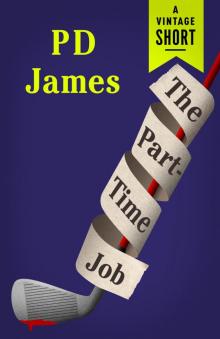 The Part-Time Job
The Part-Time Job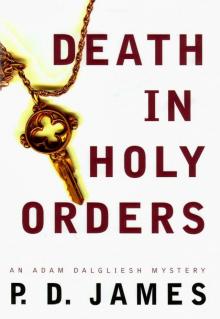 Death in Holy Orders
Death in Holy Orders The Victim
The Victim Shroud for a Nightingale
Shroud for a Nightingale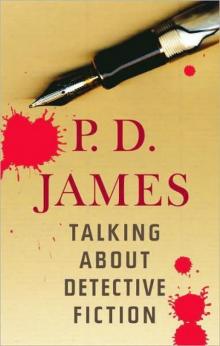 Talking about Detective Fiction
Talking about Detective Fiction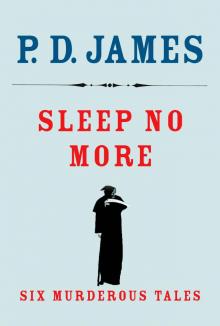 Sleep No More
Sleep No More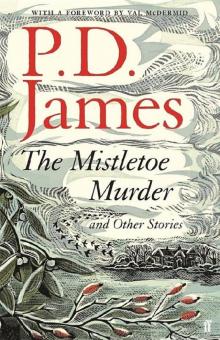 The Mistletoe Murder and Other Stories
The Mistletoe Murder and Other Stories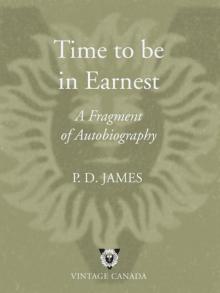 Time to Be in Earnest
Time to Be in Earnest Original Sin
Original Sin A Mind to Murder
A Mind to Murder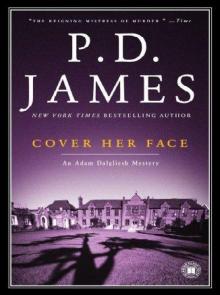 Cover Her Face
Cover Her Face Innocent Blood
Innocent Blood Devices and Desires
Devices and Desires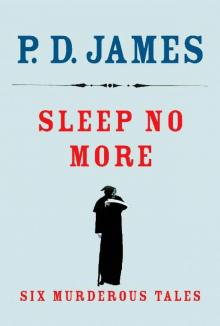 Sleep No More: Six Murderous Tales
Sleep No More: Six Murderous Tales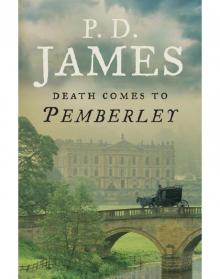 Death Comes to Pemberley
Death Comes to Pemberley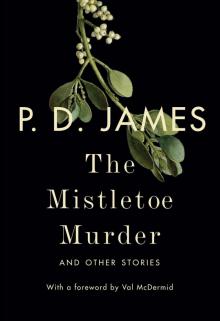 The Mistletoe Murder
The Mistletoe Murder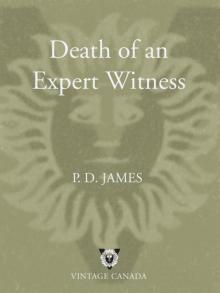 Death of an Expert Witness
Death of an Expert Witness The Private Patient
The Private Patient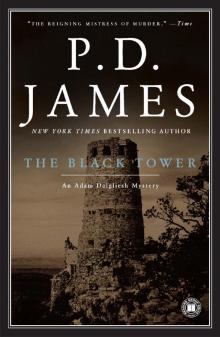 The Black Tower
The Black Tower Devices & Desires - Dalgleish 08
Devices & Desires - Dalgleish 08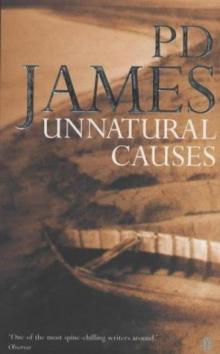 Unnatural Causes
Unnatural Causes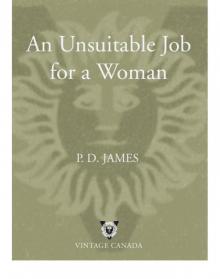 An Unsuitable Job for a Woman
An Unsuitable Job for a Woman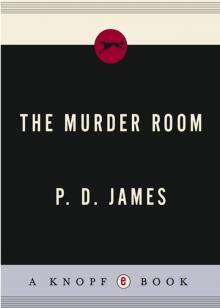 The Murder Room
The Murder Room A Certain Justice
A Certain Justice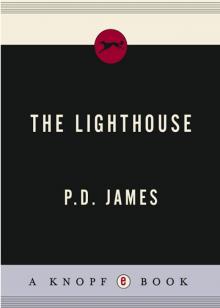 The Lighthouse
The Lighthouse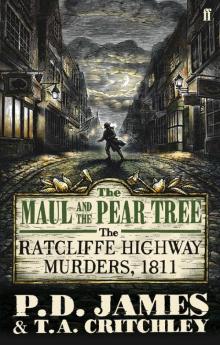 The Maul and the Pear Tree
The Maul and the Pear Tree